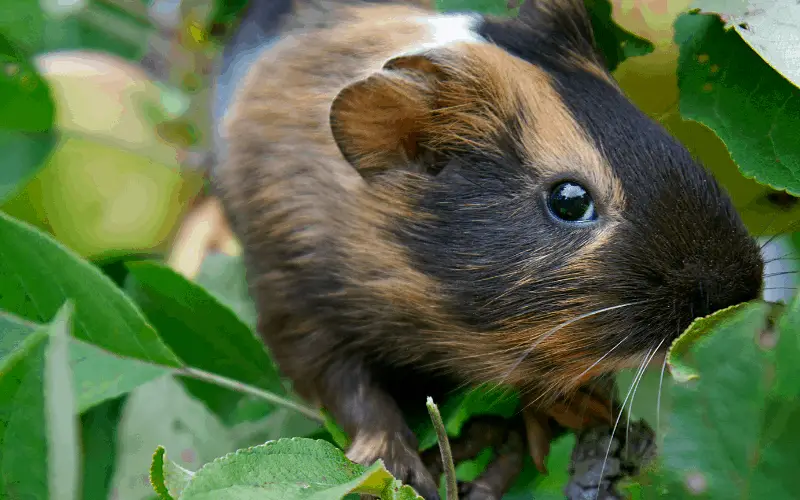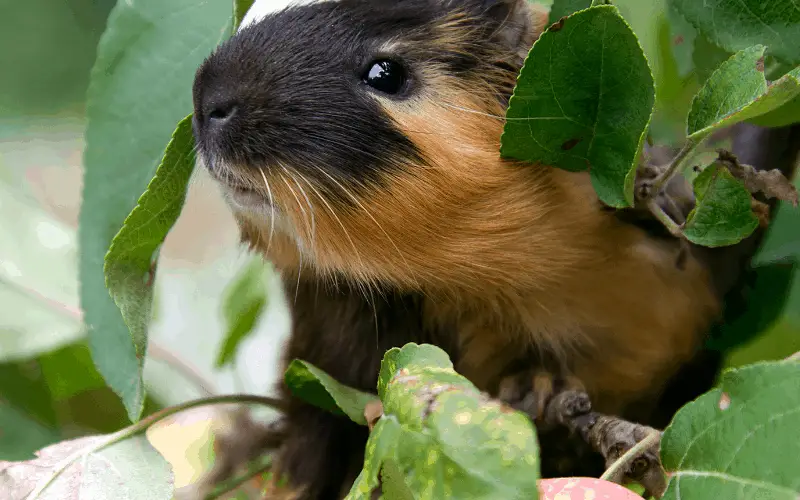Guinea pigs are cute tiny pets you can keep in your home. They are not challenging to take care of – you have to get their diet right, and you are good to go. Guinea pigs are mainly herbivores, and this means that they eat vegetables a lot, which are usually leaves from trees.

Have you ever wondered what kind of leaves guinea pigs can eat without running into digestive problems? Can Guinea pigs eat apple tree leaves? The answer to this question is yes, guinea pigs can eat apple leaves as they are nutritious.
They are one of those vegetable options that you can give your furry friend. As we go further, we will outline the importance of feeding your pet with apple leaves.
Let’s get started!
What Is an Apple?
Apples are planted all around the world. Asians were the first to grow apples. Europeans and Asians have been planting apples for years. Apples were introduced to the North American continent by the colonists from Europe.
Apple is one of those fruits that have religious, mythological, and cultural significance. For one to get a bigger apple size, the apple has to be planted with the seeds. Grafted apples come in smaller sizes.
Many people plant different apples for various reasons, including eating, cider production, and cooking. Almost half of the apples in the world are from China.
The leaves of the apple tree have an alternating arrangement. They are dark-green in color and oval in shape. The leaves have serrated margins and downy undersides.
Animals can eat every part of the apple tree except the seeds. The core, stem, and bottom, which contain the seeds are not suitable for consumption. Pet owners use the leaves of the apple tree to feed their herbivores. They are a rich source of many vitamins and minerals.
Can Guinea Pigs Eat Apple Tree Leaves?
Can guinea pigs eat apple tree leaves? Yes. They are delicious. They also provide a wide variety of vitamins that will nourish the body of your guinea pigs.
One of the reasons why apple leaves stand tall above other leaves is because they contain only a minimal amount of sugar.
It is also the right choice for your guinea pig because it has a low-fat content. Guinea pigs are prone to obesity; feeding them with foods that help them maintain body weight is ideal.
So, there is no fear when feeding your pet with apple leaves. They are very safe. Add the leaves to the diet of your guinea pig, and you will notice the enormous advantage.
Watch this video: Can Guinea Pigs Eat Apple Tree Leaves?
10 Health Benefits of Apple Tree Leaves to Guinea Pigs
Have you ever heard the statement, “An apple a day keeps the doctor away”? While this refers to the apple fruit and humans, it is also true for apple leaves and guinea pigs.
Here are the advantages of feeding your guinea pigs with apple leaves.
1. Rich Fiber Content
The leaves have a lot of nutritional fiber that is essential for digestion. These fibers make it easier for the guinea pig’s sensitive digestive system to handle and break down food.
2. Blood Sugar Control
Sugars are good and sweet. Sugars are also harmful and can cause harm when taking in excess. The apple leaves have low sugar content, so feeding your pets with it will not make the blood sugar level rise.
3. Diarrhea Treatment
Apple leaves are also great in the treatment of diarrhea. Whenever your pets start stooling a lot, feed them with apple leaves to have some respite. The apple leaves dissolve the wastewater in the stool and stop bowel movements for some time.
4. Treat Bowel Disturbance
Apple leaves do not just stop at treating diarrhea. They can also help your guinea pigs in the days of bowel disturbance. It will help alleviate pains due to inflammation and stomach upsets.
5. Weight Control
Apple leaves have enough fiber, and this helps in weight control. The leaves’ fiber makes the guinea pigs feel full even though they have eaten just a little.
This is fantastic because the apple leaves are also low in fat. This means that even in the event of excess consumption of the apple leaves, the guinea pigs’ weight is not tampered with.
6. Combat Free Radicals
Apple leaves have enough antioxidants that fight against free radicals. They clean up any free radicals that can cause fatal diseases. This strengthens the immunity of the guinea pig. In the same vein, they fight against infections that may be roaming around to infect your pet.
7. Stronger Bones
Apple leaves are lovely for growing strong bones because they contain calcium in rich quantities. Calcium is responsible for making sure the bones of the guinea pigs are well-formed and strong.
8. Prevents Oral Bacteria
Apple leaves are the ideal choice when providing your pet with chow. They ensure the health of the guinea pig’s mouth. They leave it without any bacterial infection.
9. Healthy Blood
Apple leaves have enough iron that can take care of the blood manufacturing needs of the guinea pig. They help produce healthier blood, causing your guinea pig to be less prone to infections and live long.
10. Improves Endurance
Apple leaves increases the stamina of your pet. The antioxidants in the leaves will cause more oxygen to flow through the guinea pig’s body, thus increasing their stamina.
Side Effects of Apple Tree Leaves On Guinea Pigs

There are some risks to feeding the guinea pig with apple leaves. Even though they are minute, they are worth mentioning. As a pet owner, you can avoid the risks if you are observant enough and follow all the instructions here judiciously.
Here are the risks:
1. Allergic Reactions
Just like humans, guinea pigs also have allergies. Apple leaves do not work for every guinea pig. Some may eat the leaves, and they will elicit an immune response that will traumatize the guinea pig. So, as a guinea pig owner, you have to take care of their feeding.
You have to monitor the guinea pig always to spot when they are reacting to the food they ate. Once you notice something amiss, withdraw the apple leaves and take your pet to the Vet.
2. Not Suitable for Pregnant Guinea Pigs
Whatever you do, never give apple leaves to a pregnant guinea pig. Feed her with any other vegetables available. Why? Because the apple leaves can disrupt the development of the baby pig in the womb.
How Often Should a Guinea Pig Eat Apple Tree Leaves?
You may be wondering how often should guinea pigs be fed with apple leaves. The answer is as much as you want. But this should be under supervision so you can spot when the guinea pig is having allergic reactions.
Can Guinea Pigs Eat Apple Tree Leaves? It is good that apple leaves do not have life-threatening side effects like other leaves, but this does not entail that you should only feed your guinea pig with apple leaves. You have to give them different things to eat to provide them with a balanced diet.
Can Guinea Pigs Eat Cooked Apple Tree Leaves?
Can guinea pigs eat apple tree leaves? Yes. Can guinea pigs eat cooked apple Leaves? No. You cannot give pet cooked apple leaves because they are not supposed to eat cooked foods.
They only eat raw food. Giving them prepared food is a total waste of time, resources, and energy. Again, cooking will only take away many nutrients and vitamins that are present in the leaves.
What Else Can Guinea Pigs Eat?
If you are looking for more information, walkthroughs and troubleshooting about Guinea Pigs and their diet, here are some additional posts you can check out:
Conclusion: Can Guinea Pigs Eat Apple Tree Leaves
Can Guinea pigs eat apple tree leaves? We have found that indeed they can feed on the leaves. The leaves of the apple tree are one of the best vegetables that you can give your herbivore.
They are packed with nutrients that will help the guinea pig grow and live well. Guinea pigs do not just need to eat such a nutritious veggie; they want to eat it because they enjoy it.
Due to the sensitive nature of the guinea pig’s digestive system and the possibility of an allergy, you should closely watch your pet, so you know when to stop. If you notice that your pet is acting strange, get them to drink a lot of water. The water will help flush out the toxin via urination.
In the event of any hiccups, you can always contact your local Vet. You can also contact the ASPCA and tell them what is wrong. They will come to you in no time.
